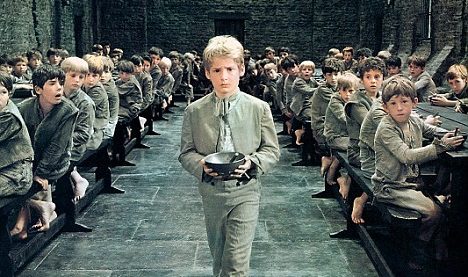Lost amidst the hoopla and funny hats of this week’s Democratic National Convention, and its historic nomination of America’s first-ever human presidential candidate, was the timely release of an “upbeat” U.S. Census report on poverty.
Proving that a “household” can still do the job a single wage-earning dad used to, median household income rose 1.3%, crossing $50k for the first time – a terrific starting salary for a recent college grad, but kind of depressing when split between the two household heads of a family of four holding down three jobs to earn it. Factor in inflation, and those briefcase-toting households actually earned $1,100 less than they did in 2001 – the year President Bush took office. At least Alice In Wonderland ran to stay in place.
But let’s turn those upside-down smiles back upside-down again, Wonderland-style, with more dubious great news from the report: for the first time during the Bush presidency, the percentage of U.S. citizens living in poverty has not risen, holding steady at 12.5%. While that double-digit percentage is considered “statistically insignificant,” “virtually unchanged,” and “flat,” the actual number of citizens living in poverty has increased year-to-year — up from 36.5 million Americans to 37.3 million. It’s easy to see how those 816,000 new poor might feel “insignificant,” or especially “flat”… but it’s hard to imagine they see themselves as all that “unchanged.”
The key to this sunny statistical anomaly is that the number of Americans swelling the ranks of poverty is irrelevant, as long as the population itself keeps growing at the same rate. In some dark, oil-depleted Mad Max future of a half billion U.S. citizens, 62.5 million of them could be utterly impoverished, bashing each other with rocks over the discovery of a discarded oil dipstick from the 20th century, and we will no doubt be boasting that our poverty population has remained “unchanged” since way back at the dawn of the 21st century. (Except that too would be technically false – back in the faux Millennium year of 2000, the waning days of Clinton’s Adulterous Presidency, the U.S. poverty rate was the lowest in twenty years.)
Maybe, like the moment in time the Terminator travels back to in order to “terminate” John Conner and ensure his own bleak future, these are the days that determine whether ours is a future of hunting-with-rocks, or something marginally better. The party of “Change” has gone as futuristic as “Armageddon” and selected a black presidential nominee; while the party that scolded Americans for “whining” about the economy is forced to defend its recent past. (On the other hand, they went all “Contact” on us in picking a female VP poised to inherit the White House.)
Whatever the outcome, start stockpiling rocks. Just in case.
But let’s turn those upside-down smiles back upside-down again, Wonderland-style, with more dubious great news from the report: the number of people without health coverage fell for the first time since President Bush took office in 2001, from 47 million to 45.7 million… the good news, of course, being all those additional premiums for healthcare insurers to provide substandard coverage which they can cancel retroactively at any time in the event they discover an undisclosed “pre-existing condition,” like DNA. Half the beneficiaries of this healthcare windfall are children in government health programs like SCHIP – the legislation that was vetoed twice by the current President.
The deliriously happy report even manages to gloss over the
One party has seemingly put its squabbles behind and electrified its constituency with the virtues of “Change,” while the other party – the one that scolded Americans for “whining” about the economy – is poised to shoot itself in its collective foot.
Somehow, annoying drabs of negative blather managed to work their way into the sunny report — about poverty rates in the South and among blacks and Hispanics, and women still earning only 78% of their male counterparts… but the real shocker is, despite making up only 25% of the population, 36% of Americans living in poverty are children.
One would think that might be an issue in an election year, that a party extolling the virtue of “Change” might, in all their speechifying, actually use the words “poverty” and “children” in the same sentence; and the other party – the one that scolded Americans for “whining” about the economy – might actually be capable of asking, why don’t they go out and get jobs? A family of four working full time earning minimum wage would equate to an annual “household” income of $54,496.00.
That would make for one sunny Census report.
If households can get out and work, so can kids.
